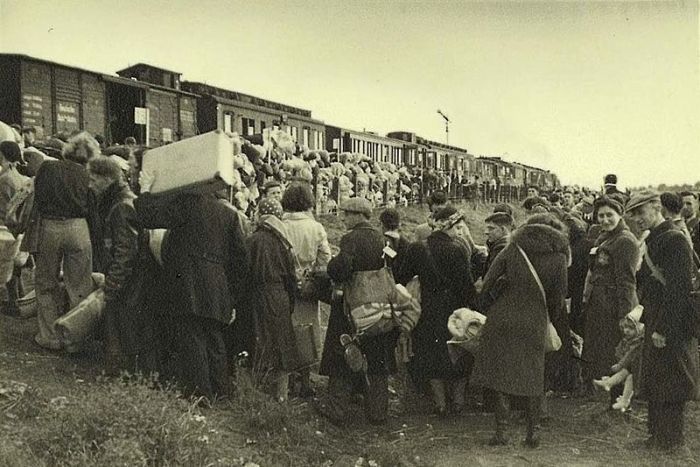
UPDATE:
Five more Dutch churches have issued “an acknowledgment of guilt” for “not having done more to save Jews or protest their murder during the Holocaust.”
[Thanks, Holly R.]
Original Post:
During World War II, while all the Dutch people suffered greatly under the Nazi boot, the plight of the 140,000 Dutch Jews was nothing short of genocidal. Some 107,000 Jewish Dutch men, women and children were transported in train cattle wagons to a dozen or more Nazi death camps bearing the now-sinister, odious names of Auschwitz-Birkenau, Sobibor, Bergen-Belsen, Dachau, Theresienstadt, Treblinka, and so on.
Once there they endured unspeakable atrocities and, for between 102,000 and 104,000 of them, a horrific death was their final fate.
The Dutch people, traditionally tolerant and compassionate, in general, did everything in their power – often at great personal risk – to protect, hide and help their Jewish neighbors and compatriots.
One of the best-known examples is, of course, the Anne Frank family and the others who were hidden in the “Achterhuis” — concealed rooms in the company building in Amsterdam where Anne’s father had worked — and who were protected for two years by employees of the company, until stormed by the Nazis on August 4, 1944.
But there are numerous other examples. These are just a few:
In 1942 and 1943, Dutch educator Johan van Hulst arranged for the transport of an estimated 600 Jewish children out of Amsterdam and out of harm’s way.
In 1942, the citizens of the northern Dutch province of Friesland, with the help of the “Amsterdam Student Resistance Group” created an “underground railroad” and took 210 Jewish children from Amsterdam to safe havens in Friesland, saving most of them from the Holocaust.
Also in 1942, 22-year-old Christian Diet Eman and her boyfriend sheltered 60 Jews, helping them to “avoid near-certain death” in Nazi death camps.
Ms. Eman, along with nearly 6,000 other Dutch non-Jews, has been recognized by Israel’s Yad Vashem (established to perpetuate the memory of the six million Jewish victims of the Holocaust) as “Righteous Among the Nations” for risking her life to save Jews during the Holocaust.
But not all Dutch political bodies (such as the NSB, the National-Socialist Movement in the Netherlands during the occupation), police, and commercial organizations acted as nobly during the Nazi occupation of the Netherlands.
The Dutch national railway company (Nederlandse Spoorwegen or NS) complied with Nazi orders and operated the trains that transported more than 100,000 Dutch Jews, first to “transit camps” and then to the Dutch border where they were transferred to German trains that would take them on to the Nazi death camps – and NS was paid for this.
In 2005, NS apologized for its role and, in November 2018, it set up a commission to investigate how it could make reparations for the injustice calling its involvement “a black page in the history of our country and our company.”
Finally, in June 2019, NS announced its plans to compensate Holocaust victims and survivors for its role in the genocide.
The Dutch newspaper De Vokskrant tells how the Dutch Railways were no exception to the rule during the German occupation: “Almost every entrepreneur wanted to do business with the Nazis.”
In addition to compensation and reparations, there have been several apologies and admissions of guilt by the Dutch government and others.
In 2000, former prime minister Wim Kok apologized for the “icy welcome” the few Jewish Nazi camp survivors (only about 5,000 out of 107,000) received on their return to the Netherlands.
In January of this year, Prime Minister Mark Rutte offered a first-ever official apology “for how his kingdom’s wartime government failed its Jews.”
In May, in another first for the Dutch government, King Willem-Alexander of the Netherlands, referring to Queen Wilhelmina’s in-exile response to the fate of Dutch Jews during World War II, “acknowledged his great-grandmother’s perceived indifference to the fate of Dutch Jews during the Holocaust.”
And last week, the Protestantse Kerk Nederland or PKN (Protestant Church in the Netherlands) announced that it will, for the first time, “confess” its guilt for contributing to a climate of anti-Semitism before, during, and after World War II. It will admit to falling short “in speaking and in silence, in acting and in not acting, in omitting, in attitude and in thoughts.”
The “confession” is to be formally offered by the PKN at the 82nd anniversary of the “Kristallnacht” pogrom, November 8.
In a commentary, editors of the Dutch newspaper Trouw — itself a paper started during World War II by members of the Dutch Resistance — write:
It is late for the PKN, as an institute, to issue such a statement 75 years after the liberation. This should have happened much earlier because many Jews felt abandoned after the war. That said, it is never too late to admit guilt and to take responsibility in order to come to terms with the Jewish community.
















